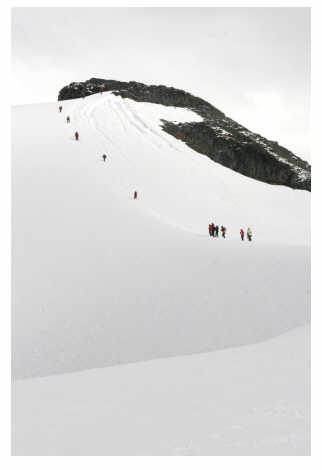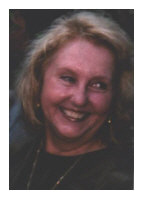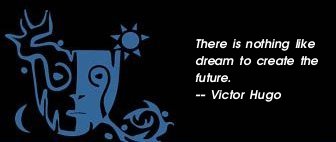|

Our Job is to Save Our World:
A Conversation With
Robert Swan, O.B.E., Explorer
by Mary Davis
 When I wrote his bio for the Mythic Journeys' 2006 Program Book, I knew that one of the presentations I must hear was that by Robert Swan. Robert Swan is the only person who has walked to both the South Pole and the North Pole. Not only is his story fascinating, the implications of what he learned on his treks are incredibly important for the future of Earth and life on Earth. And I was also interested in what makes Robert Swan tick — what creates the impulse and the drive for such daring and daunting adventures? So, I attended his lecture, which included a film about his adventures, and then I interviewed him the next morning. His presentation was powerful, partly because it is based on his authentic experiences of global warming (nothing theoretical here), and partly because he tells his story exceptionally well, a presentation so powerful that there were few dry eyes in the room. When I wrote his bio for the Mythic Journeys' 2006 Program Book, I knew that one of the presentations I must hear was that by Robert Swan. Robert Swan is the only person who has walked to both the South Pole and the North Pole. Not only is his story fascinating, the implications of what he learned on his treks are incredibly important for the future of Earth and life on Earth. And I was also interested in what makes Robert Swan tick — what creates the impulse and the drive for such daring and daunting adventures? So, I attended his lecture, which included a film about his adventures, and then I interviewed him the next morning. His presentation was powerful, partly because it is based on his authentic experiences of global warming (nothing theoretical here), and partly because he tells his story exceptionally well, a presentation so powerful that there were few dry eyes in the room.
I am not sure that I learned what gave him the drive to accomplish his feats...he says he is not a man who likes ice in his underpants, although he certainly had that experience many times. He had to mortgage his home to raise part of the money for his expeditions. None of it was easy. He says that as a boy growing up in Britain, he read about the adventures and the exploits of Captain Robert Falcon Scott. At the age of eleven, he decided that he would follow in Scott's footsteps. He was also fascinated by the journeys he read about in history, from Odysseus' journey to all of those in which people "were going off the map." By the age of thirty-three, he had become the first person to walk to both the North and South Poles, and his 900-mile journey (In the Footsteps of Scott ) across the treacherous Antarctic ice cap to the South Pole stands as the longest unassisted walk ever made. ) across the treacherous Antarctic ice cap to the South Pole stands as the longest unassisted walk ever made.
In Swan's own words, he says, "It's the Indiana Jones bit. You get out there and do something. Often people feel paralyzed about what they can do about themselves, their spirituality, the world, or politically, about the environment. I am just a guy out there, giving it a go."
He continues, "You could call me the Indiana Jones of the Environment. I'm a very simple person in many ways. If you think about it, you wouldn't do it. Life needs people to make decisions. List five things to achieve in a year, and DO IT! I can help people when they get convoluted. Just get out and do it!"
When Swan began his lecture, he showed us the large empty white screen behind him. He asked us to imagine finding a tiny dot on that huge white screen to give us a clue about finding the magnetic South Pole in the vast whiteness of Antarctica. He and his team had to cross six thousand crevasses! The leader chooses the route, so trust among the team members (and trust by the leader in his own decisions) is very important. Discipline is also critical, because if you run out of food and fuel, you are dead in five days. You must average walking twelve miles a day.
When he discussed his five member team, he said they held the team together by telling the truth and trying to listen to one another. Humour helped. And especially, integrity was important. "You absolutely do what you say you'll do! You have to keep your word."
 "Antarctica," Swan says, "is a bit like a mirror. It is about as near on earth as you can be to space. Seventy percent of all the earth's fresh water is in Antarctica. It is the one place nobody owns." He says, however, that "the fingers of disrespect" have also reached Antarctica, demonstrated by the huge amounts of trash left there. He has organized subsequent expeditions to haul away tons of trash. "Antarctica," Swan says, "is a bit like a mirror. It is about as near on earth as you can be to space. Seventy percent of all the earth's fresh water is in Antarctica. It is the one place nobody owns." He says, however, that "the fingers of disrespect" have also reached Antarctica, demonstrated by the huge amounts of trash left there. He has organized subsequent expeditions to haul away tons of trash.
On a personal level, marching under the ozone hole damaged Robert Swan's skin and eyes. His eyes changed color in seventy days, and he says, "Now, the ozone hole is three times larger."
Expanding on the mirror aspects of Antarctica and his journey, Swan says that you experience your inner landscape. "Everything is recalled, even the prenatal. You learn about yourself, the ghastly, also. Somewhere in the middle of it, there is calm, because you realize you are absolutely nothing." He also discussed his dreams, and regarding the spiritual, or 'God,' he says, "You realize the force is there. It is quite strange, very basic."
Swan's next big expedition was to the North Pole. While he felt trust was the key to his South Pole expedition, patience was the key to the North Pole effort. He organized a team of eight members from seven nations, and his team was racially diverse. He says that the real strength of the team is its members' sensitivity, care and respect for one another. Swan says, "A real man can ask another man for help."
Every fifteen days, they stopped walking for twenty-four hours of rest. They had to deal with body sores, as well as practical bodily functions in an environment where, "If you take off your gloves, your fingers freeze in thirty seconds." But the big challenge on this expedition was the unexpected warming temperature. They planned very carefully for their expedition to be completed before the August melt of the ice. However, they experienced a temperature fluctuation from -30° to +32° Fahrenheit. The ice began to melt and literally to break up under their feet in April instead of August...four months early! They were faced with the serious threat of drowning and saw no way out, until one of the team members realized that they could use the always present sunlight to keep walking...and they started maintaining 40-hour "days." Swan said that often you get so close to something, you cannot see (your way). They did find their way out and survive.
The team flew the United Nations flag, which, Swan says, "is a flag which should not be disregarded." Swan says he realized, "OUR JOB IS TO SAVE OUR WORLD." Just after their North Pole summit, Robert Swan was the keynote speaker at the first Earth Summit in Rio in 1992. He has subsequently received numerous awards and he was named an Officer of the Order of the British Empire. He co-authored the story of his South Pole expedition, In the Footsteps of Scott . .
Swan devotes his life to teaching young people and teachers about our environment and about working together across racial and national boundaries.
He organized an eight thousand mile overland voyage through parts of Africa, sharing this story with 750,000 young people.
He organized teams to participate in yacht races, with sails made from recycled bottles (and the sails did not break!). He has returned to Antarctica five times, with the most recent trip including twenty-five teachers from eighteen nations.
When I interviewed Swan, he was based in San Francisco and preparing a voyage "to the heart of America," a teaching trip up the Mississippi River in a wind and solar powered vessel. He says that the United States of America is now the world's "empire," with our 6% of the world's population using 40% of the world's energy, and that it is very important therefore to INSPIRE people here in the U.S., especially young people, about renewable energy. He feels that if attitudes in the United States change, if "kids realize it is not cool to have a gas guzzler," the necessary changes to save our world can come quickly. "The people of the U.S. have the power and the money to make the changes (to stop the melting of the polar ice) and to get the costs of the necessary changes down so they are manageable."
I asked him what he needs from us. He answered that people can participate in his efforts by sponsoring a teacher on one of his voyages or by going oneself. He also needs funds to finance the voyages and he likes to hear ideas from people. Contact information and news about Robert Swan's activities and the status of global climate change may be found at www.2041.com.
We talked more about the personal "journey" and its values. He says in addition to "giving it a go," that often it's such a difficult journey. He cited us, Mythic Journeys, as an example, too, saying, "Here's somebody who, as a small team, made this Mythic Journeys Conference happen."
Continuing, he says, "It comes down to making a decision. It is possible to undertake perhaps a different way in life. I've turned my dream, what I do, into a way to pay the bills. Perhaps for a period, you may have to downsize your life in a world consumed by consuming. It's like the Anthony Hopkins character in the film The Fastest Indian...sticking to your dreams. You can be like that. It takes perhaps being rather relentless, it takes a team...
"Don't live in fear about making your dreams happen. I'm aware that I have an amazingly dramatic story. One must protect that by looking after that story by being humble about the achievement, being realistic and humble about what was achieved. It's a lonely trail in many ways. A story like that can set you apart. You have to work very hard by sharing it with others and by allowing them, giving them the story, so they can become the storytellers, the inspirers. So anybody who has a story should be humble to protect the story and should share the story with other people."
So, let's share Robert Swan's story and our own stories, and maybe, just maybe, we can save our world.
 Mary Davis chairs Publications for the Mythic Imagination Institute. Ms. Davis was elected five times to the Atlanta City Council, serving there twenty years, making a difference for the people of Atlanta. Consultant in public policy, campaigns, strategic planning, public relations, marketing, writing, editing, and real estate; yoga teacher; actress; fundraiser; manager; civic leader and activist."You name it, I have done most of it!" she says. Mary especially enjoys her three adult daughters, four young grandchildren, and her friends, plus, of course, her involvement with the Mythic Imagination Institute, Emory University, and the Jung Society of Atlanta. Mary Davis chairs Publications for the Mythic Imagination Institute. Ms. Davis was elected five times to the Atlanta City Council, serving there twenty years, making a difference for the people of Atlanta. Consultant in public policy, campaigns, strategic planning, public relations, marketing, writing, editing, and real estate; yoga teacher; actress; fundraiser; manager; civic leader and activist."You name it, I have done most of it!" she says. Mary especially enjoys her three adult daughters, four young grandchildren, and her friends, plus, of course, her involvement with the Mythic Imagination Institute, Emory University, and the Jung Society of Atlanta.
Return to the Mythic Passages Menu
Subscribe to the Mythic Passages e-zine
|

